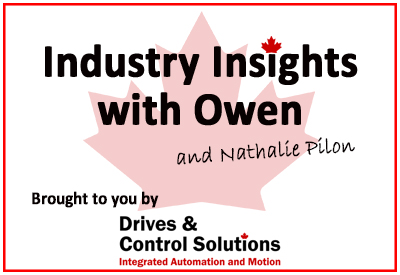Industry Insights with Owen and Nathalie Pilon

May 8, 2019
By: Owen Hurst
Industry insights are something that we are all looking for today. The issue is often where can you go to get your questions answered or to learn about the bigger issues facing the industry and how others are addressing them? That is the purpose of Industry Insights with Owen.
I speak with industry professionals daily and have listened to their concerns and insight. Now, you too can join that conversation through Panel Builder & System Integrators newly launched Industry Insight Column. This monthly column will ask industry professionals 5 questions designed to gain deeper insight for you.
In this first edition of the column I spoke with Nathalie Pilon, President of ABB in Canada. Nathalie is a true industry professional with over 20 years of experience as a nationally recognized business leader and was previously named one of Canada’s Top 100 Most Powerful Women by the Women’s Executive Network. As the Canadian President of ABB Nathalie has deep knowledge of the industry and she here grants some insight into her perspectives regarding the automation and control industry in Canada.
- As a long-standing leader within the industry if you had to sum up the growth of automation and control in Canada over the last decade in one or two sentences what would that look like?
I think one of the primary challenges for automation and control in Canada is how to get the integrators involved. In the last decade there have been so much new technology unveiled and we need to better engage integrators in order to bring these solutions and technologies to the plant floor. This is a problem I have faced for some time. How do we get an integrator to do discrete automation and not focus specifically on automotive or another niche sector? The primary sectors such as automotive manufacturing have received a lot of money and attention and are ready to receive these solutions and technologies, but that readiness is not apparent across the board. What we see now are smaller firms and integrators that are working to develop solutions that bring together all the best options provided by manufacturers, but more support needs to be provided to them rather than to primarily larger firms in the dominating sectors.
“I recall this issue was prevalent in a situation I faced 10 years when trying to implement a solution offering into a manufacturing facility. It was necessary at the time to employ several integrators for the project as no one company wanted the risk associated with taking on the full project from end to end.” This is an important point that I often push with the government about how we can help these firms and integrators grow to where they can implement solutions to plant floor and progress our automation implementation.
We can talk just about the panel or any one component, integrated solutions go beyond one or more components or portions of a project. Manufacturers like ABB provide a plethora of tools and components that provide A to Z solutions, and now we need to support the integrators and smaller firms in their ability to fully utilize everything being offered by manufacturers to implement that full solutions offering.
- Are there any substantial challenges to the expansion of the automation and control industry in Canada that are not an issue among other developed nations?
N – We often forget that our country is so big and that we have many industry sectors that are often overlooked because we tend to focus on only a few large industries, as noted above, that are well entrenched in the “industry 4.0” era. What we need to remember is that there are numerous smaller companies that are both working in these larger sectors, but also that are working in smaller, but just as important sectors, that are embracing or are prepared to embrace automation.
O- Nathalie makes an extremely valid point here that I have heard again and again when speaking with manufacturers and distributors. The components and solutions are here to enhance a wide range of industries, but those industries need to be prepared to implement to technology, and further their needs to be firms in place to aid those companies in implementing automation and helping them with maintenance.
- Product development is key to maintaining a competitive edge today, how does ABB continue to maintain its leading role within the industry?
N – In product development it is all about making sure you concentrate your efforts. We at ABB have increased our centres of research and get our applications out of that and then move to bring the new developments to the industry.
O – This is another point I have heard from numerous industry professionals. Research and development have certainly become a pillar of maintaining product development with so many companies vying to develop the next big component or solution offering.
- What new or advancing trends do you feel will dominate throughout 2019?
I don’t think any one trend dominates a year, but I think we will continue to see two primary focuses this year. First it is about automation and the advancement of digitization. Digitization is a primary focus among all levels of industry and manufacturers in particular are now focused on developments that meet the connectivity needs of an automated industry.
Secondly is the substantial push we are currently seeing to develop more advanced Energy-storage solutions. Although this may not be a 2019 trend it is a major up and comer that is going to really change the way we operate. New methods of energy storage will have affects that go well beyond just storing energy but will affect how we transfer and use it. It will be exciting to watch how this enfolds over the next few years.
- Are there any issues or concerns facing the industry in Canada that are keeping you awake at night?
When looking in a broad sense, supply-chain disruption is a major focus that is going to change investment and how we look at the economy for 2019 and into the future. Whether it be economic, trade or internal issues the ability to avoid supply-chain disruption is unlikely and will maintain a major focus. It is all about serving the customer and ensuring that we, and the wider industry does not suffer from supply-chain disruptions is certainly a concern of mine.




